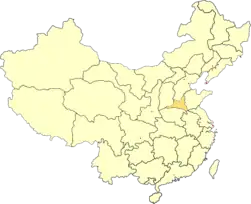Pingyuan Province
Pingyuan (Chinese: 平原; pinyin: Píngyuán) was a former province of the People's Republic of China that existed between 1949 and 1952. Its capital was Xinxiang, now in Henan province.
| former province of the People's Republic of China 平原省 Pingyuan Province (1949-1952) | |
 | |
| Capital | Xinxiang |
History
Pingyuan Province was established on August 20, 1949, comprising adjoining prefectures in the provinces of Henan and Shandong:
- Xinxiang, Henan (along with then-separate urban centre Xinxiang City)
- Puyang, Henan
- Anyang, Henan (along with then-separate urban centre Anyang City)
- Heze, Shandong
- Huxi, Shandong
- Liaocheng, Shandong
Pan Fusheng was the first Communist Party Chief of the province,[1] and Chao Zhefu was its only governor.[2] In March 1950, a number of peasants and cattle froze to death when transporting grain to government storage in Puyang prefecture. Pan took partial responsibility for the "Puyang Incident" and was demoted to deputy party chief.[1] He was replaced by Wu De.[3]
The province was abolished on November 15, 1952. Its component territories were returned to their original provinces - with the exception of Anyang's Wu'an, Shexian and Linzhang counties, which were transferred to Handan prefecture in Hebei.
Administrative divisions
| Name | Administrative Seat | Simplified Chinese | Hanyu Pinyin | Subdivisions |
|---|---|---|---|---|
| Xinxiang | Xinxiang | 新乡市 | Xīnxiāng Shì | none |
| Anyang | Anyang | 安阳市 | Ānyáng Shì | none |
| Heze Division | Heze County | 菏泽专区 | Hézé Zhuānqū | 8 counties |
| Huxi Division | Dianxian | 湖西专区 | Húxī Zhuānqū | 2 counties |
| Liaocheng Division | Liaocheng County | 聊城专区 | Liáochéng Zhuānqū | 11 counties |
| Puyang Division | Puyang County | 濮阳专区 | Púyáng Zhuānqū | 7 counties |
| Anyang Division | Anyang County | 安阳专区 | Ānyáng Zhuānqū | 6 counties |
| Xinxiang Division | Xinxiang County | 新乡专区 | Xīnxiāng Zhuānqū | 13 counties |
References
- 潘复生 [Pan Fusheng] (in Chinese). Xinhua. Archived from the original on 18 May 2010. Retrieved 15 October 2014.
- Yang Dezhi. "Chao Zhefu" (in Chinese). People's Daily. Retrieved 15 October 2014.
- "Wu De" (in Chinese). People's Daily. Retrieved 15 October 2014.